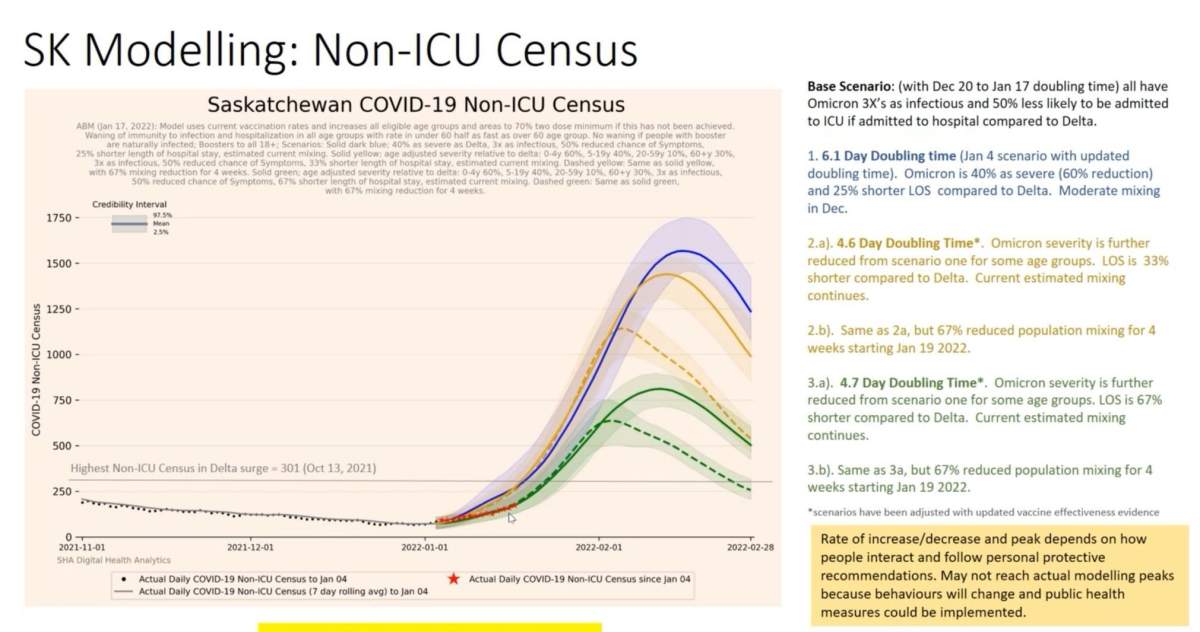The leaders of six Saskatchewan labour unions are urging the Saskatchewan government to implement restrictions as COVID-19 cases surge in the province.

They are calling on the Saskatchewan government to heed the measures recommended by Dr. Saqib Shahab, the province’s chief medical health officer, on Jan. 12.
These include limiting gathering sizes to 10 people, limiting the frequency of gatherings and establishing consistent bubbles, and limiting non-work and non-school contacts.
“By continuing to do nothing, our government has made it clear that they do not care about whether or not workers get sick,” said Lori Johb, president of the Saskatchewan Federation of Labour.
“The Omicron variant of COVID-19 is a clear workplace occupational health and safety hazard, and it’s time for our government to step up and do their duty to make sure that workers are kept safe at work.”
Johb was joined by the head of the Saskatchewan Teachers’ Federation (STF), SGEU, SEIU-West, the Saskatchewan Union of Nurses (SUN) and CUPE Saskatchewan asking for the measures.
Collectively, the unions represent more than 113,000 workers in the province.
Earlier this week, Saskatchewan Premier Scott Moe rejected any new measures for the province.
“Omicron is spreading across Canada and around the world, whether there are lockdown policies in place or not, so we are not going to impose new restrictions and lockdowns that cause significant harm for no clear reason,” Moe said in a Twitter thread Tuesday.
“Instead, we are going to continue promoting and delivering preventative measures that are effective, like rapid tests and booster shots.”
Maintaining the status quo is leading to the rampant spread of COVID-19 and straining services across the province, the labour groups said.

Get weekly health news
Staffing shortages and burnout are being reported, and many sectors report they are operating in a crisis mode.
“We need to take these steps to protect the public and our registered nurses who want to be able to provide safe, high-quality care to Saskatchewan patients but are unable to do so with extreme staffing shortages, and with health services already overwhelmed,” said SUN president Tracy Zambory.
Saskatchewan has reported more than 1,000 new COVID-19 cases daily over the last six days, with active cases in the province as of Wednesday at 11,894.
Hospitalizations have shot up from 79 at the beginning of the year to 199 on Wednesday, with 21 people in intensive care.
Dr. Alexander Wong said hospitalizations could peak between 750 and 1,500 patients in mid-February based on modelling he has from the Saskatchewan Health Authority.
He said that if measures are not brought in and COVID-19 runs unchecked, it could destroy the province’s health-care system.
“To be clear, NO scenarios avoid cancellation of ALL ‘non-live-saving’ procedures and surgeries again. That’s INEVITABLE at this point,” Wong said in a Twitter thread Thursday.
“Letting COVID run unchecked as @SKGov has, sacrifices the health of ALL #SK citizens, destroys the publicly-funded healthcare system, and results in immeasurable health consequences (kids!! the vulnerable!!), suffering, & deaths.”
Wong said it is not too late for the government to bring in measures to save the province’s hospitals.
“If they do nothing, that’s implicit endorsement they’re OK with letting #SKs smoldering healthcare system burn down yet again.”
Moe said while modelling is one source that is considered when making policy decisions, greater emphasis is placed on “actual real-time data from across Canada to inform our COVID-19 response.”
“The government recognizes that hospitalizations are rising and will continue to rise for some period of time,” Moe said in a statement Thursday.
“Saskatchewan’s current rates of COVID-19 related hospitalizations, ICU admissions and deaths are currently well below the national average and well below other provinces that have introduced severe restrictions.”
He rejected calls for new measures.
“However, we see no clear evidence that lockdown measures have reduced hospitalizations, ICU admissions and deaths in other provinces and as a result, there is no reason to impose harmful new restrictions in Saskatchewan.”












Comments